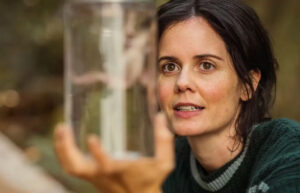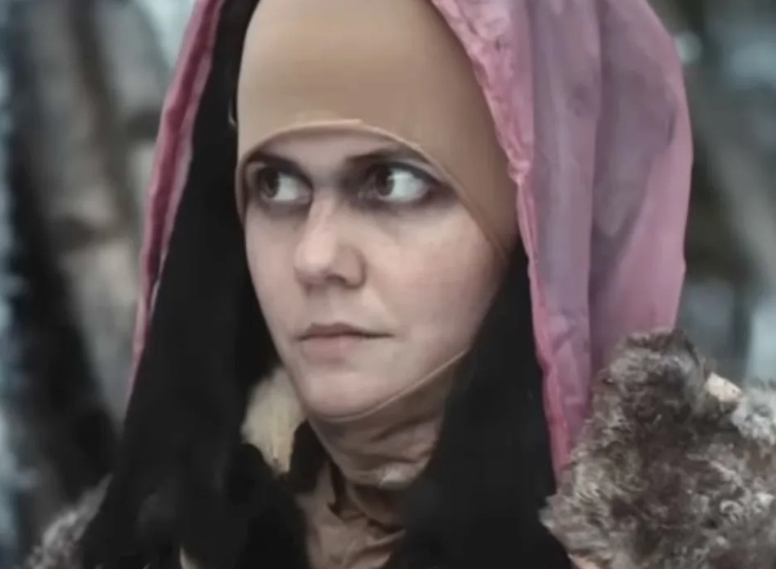
If you were watching Yellowjackets Season 3 expecting your usual dose of trauma-fueled survival horror, haunting antler cult flashbacks, and cryptic clues wrapped in blood-soaked nostalgia—well, you got all that. But what no one expected was the twist that came midway through the season: a character known in the script only as The Frog Scientist becoming the linchpin of the show’s most bizarre, philosophical, and emotionally complex plotline yet.
And no one is more surprised—or more proud—than Ashley Sutton.
A writer and co-producer on the hit Showtime series since Season 2, Sutton stepped into the spotlight this year with a storyline that has divided the fandom, enthralled critics, and practically broken Reddit with theories. In a conversation that bounces between literary references, frog biology, and the ethics of storytelling, Sutton walks us through how a side character with a weird nickname became the centerpiece of spring television’s strangest—and smartest—twist.
From Background Noise to Biological Riddle
Originally introduced in Season 2 as a throwaway mention—“someone’s weird uncle who studies amphibian memory”—The Frog Scientist became something more in Season 3, Episode 4. A sudden cut to a bunker-like lab, jars filled with preserved frogs, and a disheveled man mumbling about “neural echo fields” sent a ripple through the season’s central timeline.
“It was kind of a dare,” Sutton laughs. “We kept asking ourselves, What if the most out-there element was also the key to the whole thing?”
According to her, the idea was born from late-night writers’ room delirium and a fascination with real-world studies on amphibian memory retention after freezing. “There’s a specific type of wood frog that can literally survive being frozen for weeks, then thaw out and hop away. No trauma. No memory loss. Perfect recall. We started joking: What if that was the model for human trauma?”
That seed grew into something darker, stranger—and deeply Yellowjackets.
Science, Memory, and the Philosophy of Pain
“The show’s always been about memory and trauma,” Sutton says, “but what does it mean to remember everything without distortion? What if forgetting is a survival tactic?”
Enter The Frog Scientist—real name revealed to be Dr. Edward Lemoine, a disgraced neurologist turned recluse. In Episode 6, we find out he’s connected to the post-rescue timeline. In the 2000s, he was working with one of the Yellowjackets survivors, trying to replicate the frogs’ memory resilience in humans through deep brain stimulation, hallucinogenic toad venom, and ethically questionable isolation therapy.
“It’s twisted,” Sutton admits. “But in his mind, it’s kindness. He wants to take away the distortion of trauma, give these women a clean, unfiltered version of their past. The problem is… they don’t want that.”
The ethical tension is the kind of thing Yellowjackets thrives on. Is healing about understanding your past, or learning to live with not fully knowing? Is memory the enemy, or the only real map back to yourself?
Casting the Uncastable
Bringing The Frog Scientist to life took more than good writing. It needed a face that could balance intensity with absurdity, intellect with danger. Sutton says the casting process was “chaos.”
“We joked about getting Jeff Goldblum, obviously. Then someone threw out David Thewlis. Too sinister. And then, someone just said: What about Wallace Langham? Total curveball. But once we saw him read, it clicked.”
Langham, best known for CSI and a long string of quirky supporting roles, delivers a performance that’s immediately unsettling and weirdly sympathetic. His scenes are eerie, almost Lynchian in tone, but he never pushes too far. You believe he believes he’s helping.
The turning point? Episode 7’s monologue, where he compares trauma to frog hibernation: “Some people, they freeze up for years. Decades. But if you wake them up too soon… they’ll die. You have to wait until it’s safe. But what if it’s never safe?”
Sutton wrote that scene herself. “That was the heart of the whole arc.”
Plot Device or Philosophical Core?
It would be easy to write The Frog Scientist off as a gimmick—a side quest in an already crowded series. But Sutton sees it differently.
“He’s not a plot device. He’s a mirror,” she says. “Each of the women has built some kind of survival structure—denial, addiction, obsession, control. Lemoine offers them a brutal form of clarity. And they all react differently.”
In the standout Episode 8, Natalie (played with haunted brilliance by Juliette Lewis) willingly enters Lemoine’s lab to “see the truth.” The result is a hallucinatory sequence that mashes flashbacks, distorted present scenes, and raw emotional confessions. It’s been called one of the most ambitious TV episodes of the year.
“It’s not about resolution,” Sutton says. “It’s about exposure. What happens when you can’t lie to yourself anymore?”
The Reddit Spiral and Fan Frenzy
As soon as The Frog Scientist showed up, fans lost their minds. Reddit threads exploded. Theories ranged from “he’s the Antler Queen’s son” to “he doesn’t exist at all, he’s a hallucination created by group guilt.” Sutton says they read all of it.
“We knew it would be polarizing,” she laughs. “Some people thought it jumped the shark. Others thought we’d finally gone full prestige-weird.”
She admits some of the deeper theories were right on the money—but won’t say which. “I’ll just say this: We play fair. There’s a logic to everything we do. Even the frogs.”
Behind the Scenes: Building the Frog Lab
One of the most visually arresting sets this season was Lemoine’s subterranean lab—a cluttered mess of scientific equipment, amphibian tanks, chalkboard equations, and unsettling frog-related diagrams. It’s part mad scientist hideout, part psychological horror set.
Production designer Daria Calvelli pulled references from vintage biology labs, Cold War-era bunkers, and outsider art installations. The result was a space that felt out of time—“like it had been growing underground since the ‘90s,” Sutton says.
And yes, those were real frogs. “No frogs were harmed,” she laughs. “But there were handlers. And paperwork. So much paperwork.”
Reactions Inside the Writers’ Room
Not everyone was immediately on board with making The Frog Scientist a centerpiece. Some writers were wary it would break the tone of the show.
“There was pushback. Valid pushback,” Sutton says. “We had to prove it wasn’t a gimmick. That it earned its place emotionally, not just narratively.”
Showrunners Bart Nickerson and Ashley Lyle eventually signed off after reading the Episode 6 script. “They saw the long game,” Sutton says. “That this wasn’t about frogs—it was about memory, pain, and how far you’d go to forget.”
Where It All Leads: That Ending
Without giving away too much, the final two episodes of the season twist the knife in unexpected ways. Lemoine’s methods, though horrifying, result in revelations that fracture the survivors’ already unstable alliance. One character disappears. Another relapses. One finally remembers something so awful, it changes her entire arc.
And Lemoine? He vanishes.
“His exit was crucial,” Sutton says. “He’s not the villain. He’s not the savior. He’s the spark. And then he’s gone.”
The final shot of the season—an empty frog tank, slowly filling with rainwater—left fans debating everything from resurrection metaphors to climate change symbolism.
“That’s how we like it,” Sutton grins. “Let them argue.”
Legacy: A Risk That Paid Off
Looking back, Sutton says she’s proud of how far the show pushed itself.
“It would’ve been easy to stick to the formula. But Yellowjackets has always been about risk. This season, we leaned into the weird. And it worked.”
Critics largely agree. The New Yorker called Sutton’s arc “a fascinating detour into science-gone-rogue storytelling,” while IndieWire said the show “earned its chaos” with some of its “most finely tuned madness yet.”
And for Sutton personally?
“It’s surreal,” she says. “I joined the show as someone who loved it from afar. To now be part of shaping its weirdest twist? That’s the dream. Or maybe the nightmare. In a good way.”
TL;DR: The Frog Scientist was never just a twist—he was the key to understanding how Yellowjackets sees trauma. And thanks to Ashley Sutton, spring TV finally gave us a mind-bending arc that actually made us think, feel, and yes—Google frog hibernation.
No comments yet.









